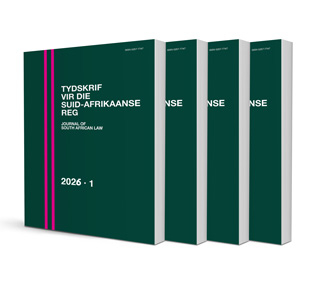A judicial review of “any other arbitrary ground” as a ground of unfair discrimination under section 6(1) of the Employment Equity Act 55 of 1998

ARTIKEL
A judicial review of “any other arbitrary ground” as a ground of unfair discrimination under section 6(1) of the Employment Equity Act 55 of 1998
Author: Elsabé Huysamen
ISSN: 1996-2207
Affiliations: Senior Lecturer in Mercantile and Labour Law, University of the Western Cape
Source: Tydskrif vir die Suid-Afrikaanse Reg, Issue 1, 2026, p. 70-93
https://doi.org/10.47348/TSAR/2026/i1a5
Abstract
Binne die oorkoepelende reg op gelykheid soos gewaarborg deur artikel 9 van die Grondwet van die Republiek van Suid-Afrika, 1996, word differensiële behandeling op ontoelaatbare gronde, of om ontoelaatbare redes, spesifiek verbied ingevolge die grondwet se bepalings oor onbillike diskriminasie (a 9(3) en (4)). In die arbeidskonteks word hierdie grondwetlike beskerming teen onbillike diskriminasie grotendeels gereguleer deur die Wet op Gelyke Indiensneming 55 van 1998. Dit was eers ingevolge die Gelyke Indiensneming Wysigingswet 47 van 2013 dat die frase “enige ander arbitrêre grond” in 2014 geïnkorporeer is in artikel 6(1) van die Wet op Gelyke Indiensneming. Alhoewel hierdie frase, en die betekenis daarvan, met eerste oogopslag eenvoudig gelyk het, het die ontleding en toepassing daarvan aanvanklik tot wydverspreide debat gelei.
Teen die voorafgaande agtergrond bied hierdie artikel ’n oorsig van hoe die kommissie vir versoening bemiddeling en arbitrasie (KVBA) en arbeidshowe die frase “enige ander arbitrêre grond” binne die bestek van eise gebaseer op onbillike diskriminasie ingevolge die gewysigde artikel 6(1) geïnterpreteer het. Die bespreking begin met ’n oorsig van ’n tydperk van relatiewe onsekerheid wat onmiddellik gevolg het na die 2014 wysigings tot die Wet op Gelyke Indiensneming. Gedurende hierdie tydperk het die KVBA en arbeidshowe uiteenlopende benaderings gevolg rakende die vraag of “enige ander arbitrêre grond” eng of breed geïnterpreteer behoort te word. Ingevolge ’n eng benadering word die frase vertolk as ’n ongespesifiseerde, maar analoë grond tot die lys van gronde wat reeds in artikel 6(1) vervat is. Gevolglik, en soortgelyk aan die posisie voor die 2014 wysiging van artikel 6(1), bestaan daar steeds net twee kategorieë van verbode gronde: gelyste en ongelyste (of arbitrêre) gronde. Daarteenoor, ingevolge ’n breë benadering, moet “arbitrêr” geïnterpreteer word as irrasionele of wispelturige optrede. Ingevolge ’n breë benadering het die uitdruklike toevoeging van die frase “enige ander arbitrêre grond” dus die bestaan van drie duidelike kategorieë van verbode gronde aangedui: gelyste, ongelyste én arbitrêre gronde.
Vervolgens val die klem op die arbeidshof se uitspraak in Ndudula v Metrorail, gevolg deur die arbeidsappèlhof se beslissings in Naidoo v Parliament of the Republic of South Africa en Minister of Justice and Correctional Services v Ramaila, wat gesamentlik ’n waardigheid-gefokusde (eng) benadering tot die interpretasie van die frase bevestig het.
Ten slotte bespreek die artikel belangrike lesse wat geneem kan word uit regspraak tot op datum en belig dit die beginsels en oorwegings wat die KVBA en arbeidshowe se huidige benadering tot eise van onbillike diskriminasie op ’n arbitrêre grond gevorm het.